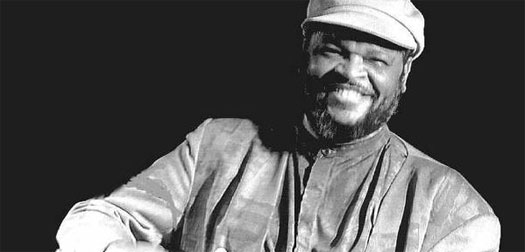|
|
|
|
 |
||
|
|
|
For close to forty years‚ guitarist Melvin Sparks has been making records and bringing jazz music to the dance floor.
Melvin's playing has been an inspiration to a whole new era of jazz and funk musicians.
Be on the look out for a new album entitled It Is What It Is.
Mike McKinley: The first thing I'd like to talk about is the profound influence that the sound from your era has had on a lot the improvisational music we're hearing today. When I was in college a friend of mine turned me on to all of these great acid jazz albums from the sixties -- it was like this new world of discovery. So, I was a kid into the Grateful Dead and Phish‚ you know‚ these improvisation rock-oriented bands. Then I heard this music that you were a part of and at that same point in time it seemed that a lot of these young bands coming out were heavily influenced by that music‚ and covering and imitating that classic sound. It feels like there's been a rebirth of that music.
Melvin Sparks: Yeah... it was done so long ago. The average person listening to it now‚ when we were recording it wasn't even born (laughs). So it's new to them and it's kind of like a rebirth.
MM: What was it like then? Playing live and putting out albums -- how was the response then?MS: The response with the audience was different because back in those days we were performing more for African-American audiences and more than anything... it used to be called the "Chitlin' Circuit" music (laughs)‚ back in the days of Lou Donaldson‚ Jack McDuff‚ you know‚ back in those times. So the audience today is much different.
MM: Yeah‚ obviously up here in Vermont…
MS: (Laughs) Yeah‚ it's really like that all over the country. You know‚ mostly college-aged people‚ but the audience is well-mixed -- there are a lot of different people enjoying the music.
MM: Well‚ it's good-time music.
MS: Yeah‚ and I love playing it. I love doing it -- it's all good.
MM: I think the music is really interesting because of the combination of the big funk rhythms, and the solos that use a lot of the jazz language -- where in the improvisation there are a lot of spontaneous melodies and hooks in the moment.
MS: Yeah‚ it's jazz with funk underneath it. I like to say it's a James Brown kind of rhythm and then you play whatever you want on top. I personally prefer playing melodic-style jazz on top of the funk rhythm. I tend to like the Be-Bop melodic concept in my playing on top of the funk rhythm. I love the funk though (laughs).
MM: Sure‚ there's nothing like it to get the whole room cooking.
MS: That's what we try to do‚ but boy‚ it ain't easy (laughs).
MM: Certainly. You've been doing it for a long time.
MS: Close to forty years‚ not exactly forty years‚ but close (laughter). I came up through an R&B group (The Upsetters) before I landed in New York and switched over and started to try to play jazz with the guys up here. Those old days were rough.
MM: Yeah?
MS: Yeah‚ it was rough back then because you really had to work at being the best musician you could be if you wanted to hang with those guys -- the established musicians. They'd put a lot of pressure on you to make you learn your instrument.
MM: Yeah‚ especially if you were part of a working band‚ right?
MS: Yeah‚ well‚ even if you were going around sitting in with these guys -- just to get known. Back in the sixties‚ you know‚ that wasn't easy.
MM: I've read about that a bit. Your brother (Danny Sparks) was a drummer‚ right?
MS: Yeah‚ my brother was a drummer‚ and I would throw his name around. That just got me through the door‚ but I still had to play the music (laughter). If I was terrible they'd throw me out and then go look for my brother to beat him up. That was just to get me in‚ because a lot of times when you're new it wasn't easy for them to let you sit in and perform with them. I'm talking about some of the established musicians back in those days.
new to state of mind
Shows: moe.
Shows: Yonder Mountain String Band
Shows: Grand Point North 2014
Shows: Catskill Chill 2014
Shows: moe.down 15
Shows: Gov't Mule
Shows: Umphrey's McGee
Shows: Newport Folk Festival 2014
Shows: Widespread Panic
Albums: Phish - Fuego
Shows: moe.
Shows: Yonder Mountain String Band
Shows: Grand Point North 2014
Shows: Catskill Chill 2014
Shows: moe.down 15
Shows: Gov't Mule
Shows: Umphrey's McGee
Shows: Newport Folk Festival 2014
Shows: Widespread Panic
Albums: Phish - Fuego
most popular
Blog: Radiohead: Adam King tries to convince me they are aliens…
Blog: New Video/Song From Dr. Dog - "Broken Heart"
Blog: Mountain Oasis welcomes NIN‚ Bassnectar and Pretty Lights
Blog: Mehliana Tour (Brad Mehldau + Mark Guiliana)
Blog: Video: Club d'Elf with Marco Benevento - "Bass Beatbox"
Blog: Reed Mathis and Victor Wooten Talk Bass
Features: Conversation with Kurt Rosenwinkel
Features: Conversation with Tommy Benedetti of John Brown's Body
Features: Conversation with Bill Kreutzmann
Shows: Rothbury 2009
Blog: Radiohead: Adam King tries to convince me they are aliens…
Blog: New Video/Song From Dr. Dog - "Broken Heart"
Blog: Mountain Oasis welcomes NIN‚ Bassnectar and Pretty Lights
Blog: Mehliana Tour (Brad Mehldau + Mark Guiliana)
Blog: Video: Club d'Elf with Marco Benevento - "Bass Beatbox"
Blog: Reed Mathis and Victor Wooten Talk Bass
Features: Conversation with Kurt Rosenwinkel
Features: Conversation with Tommy Benedetti of John Brown's Body
Features: Conversation with Bill Kreutzmann
Shows: Rothbury 2009
